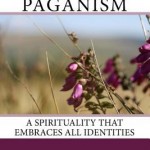I have always felt it would be better to define Paganism and Pagan traditions on their own terms. If we draw a contrast with some other tradition’s theology, we always reinforce a simplistic outsider’s view of that tradition.
For instance, if you always say “our tradition is polytheist, unlike Wicca which is duotheist”, then you are denying and erasing the existence of polytheist, animist, pantheist, and atheist Wiccans. You are also over-simplifying what it is that Wiccans actually practice and believe. Even Wiccan covens who honour a specific male and female pair tend to be polytheistic and to regard the pair or couple they are honouring as their patron deities, two special deities among many other deities.
Another example: if you are always contrasting Pagan ideas with a simplistic view of Christianity (such as that promoted by fundamentalists and evangelicals), you are erasing and denying a rich and varied tradition of mystics, heretics, and even alternative views expressed within mainstream Christianity. You are setting up those Christian views as a straw man to be knocked down. It’s an easy target, but it just makes you look a bit ill-informed about Christianity.
A certain (possibly mythical) itinerant rabbi during the Roman occupation of the Middle East is reported to have said, “Those who are not against us are with us”. (He is also reported as saying, “Those who are not with us are against us”, but that just goes to show that the text is unreliable, so you need to make up your own mind.) I like this saying – I would rather build bridges than dig defensive ditches. If we are going to build Pagan values into the wider society, the way to begin is to break down stereotypes and make alliance with other liberal faith traditions, not treat them with suspicion and derision.
Critiques of the bits of Christian theology that Pagans don’t like (penal substitution theology, hellfire and damnation, exclusivism and sectarianism, anti-LGBT rhetoric) are becoming louder and louder from within the Christian community. The people who are criticising those aspects of Christianity are our allies, not our enemies. Just because they wear the label Christian, does not make them automatically the enemy. I shouldn’t even need to be saying this.
Of course Christianity has been the dominant discourse for a long time, and we need to challenge the hegemony of ideas about belief being the primary source of belonging to a religion (which is in fact unique to Christianity), but actually occulture is gaining traction, according to Christopher Partridge in The re-enchantment of the West. Ideas such as reincarnation, karma, destiny, synchronicity, and so on are more widely understood and talked about than (for example) Christian notions of salvation.
Apart from getting other people’s theology wrong when we use it to define what Paganism is, I think it is not helpful to define a thing by what it isn’t. Instead we should define it by what it is. We can say that Paganism is life-affirming, world-affirming, sex-positive, non-hierarchical, and inclusive. We don’t need to say that other religions do not possess those qualities (whether or not it’s true) in order to make that point.
We can of course draw on helpful theological ideas from other traditions (whilst bearing in mind issues of cultural appropriation) such as process theology, apophatic theology, creation spirituality, Transcendentalism, Taoist ideas, and so on. We don’t exist in a theological and philosophical vacuum. Indeed, other traditions (including Judaism and Christianity) are drawing on Pagan ideas about the environment and the Goddess to fill the gaps in their discourse.
If we set up Paganism as the thesis, and something else as the antithesis, then we ignore the possibility of synthesis. We create a dualistic and divisive view of the world. In fact, things are not either/or, black and white, male and female – there is multiplicity and diversity. We do our traditions of polytheism, multiplicity and diversity a disservice if we reify and reinforce a dualistic and oppositional view of the world.
Religions are like trees. They grow in a specific context, with many roots and branches. They are pruned by humans, and weathered by storms, and they are affected by other trees (other religions). You can’t look at a single branch of a tree and insist that it is the whole tree. Nor can you insist that the tree is only its trunk. All the many branches, and the roots, and the trunk, and the forest around it, are part of the tree.

















